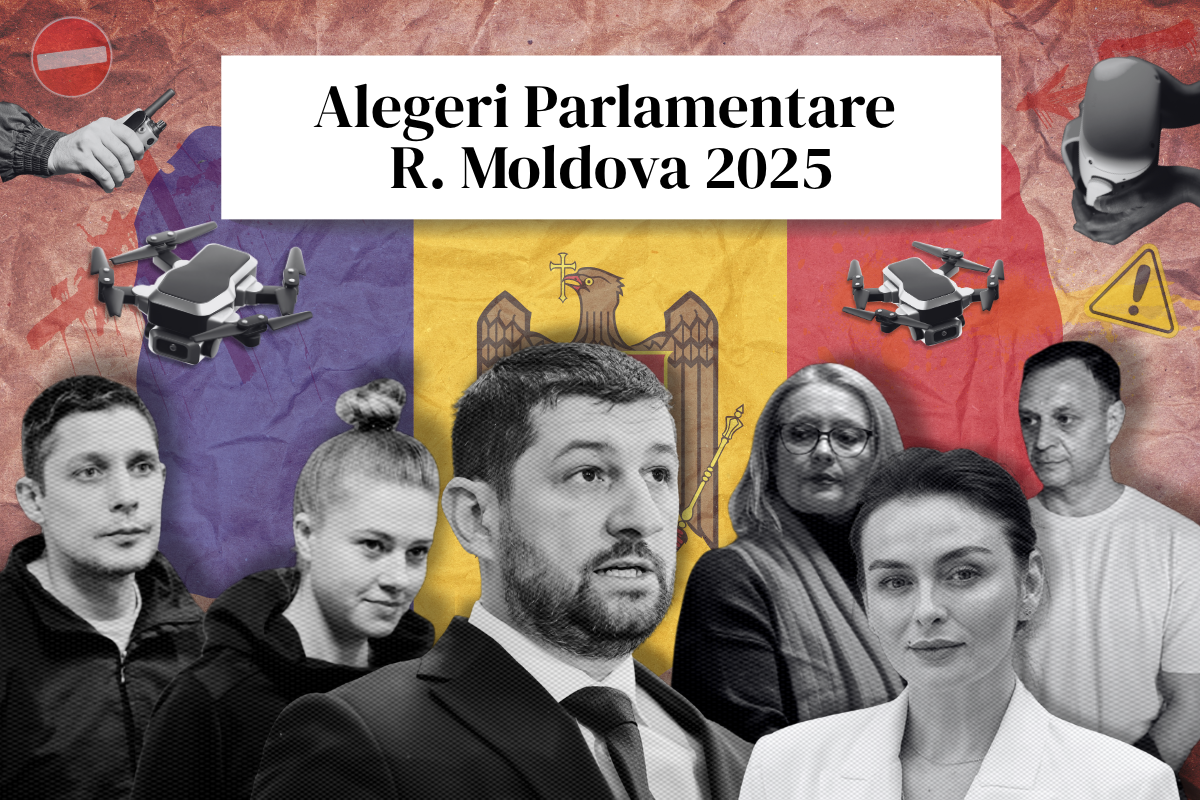Propaganda from Romania’s far-right Alliance for the Union of Romanians spreads to Moldova; Moldovans trained in guerrilla camps to incite mass unrest, build explosives, and fly drones; the myth of “dictatorship” in Moldova, and newly sanctioned EU-sanctioned politicians.
As Moldova gears up for a pivotal parliamentary election on Sep. 28, the former Soviet republic is allegedly facing a deluge of destabilisation campaigns that threaten to undermine the democratic process.
AUR’s disinformation machine exported across the Prut
Ahead of Moldova’s parliamentary election, Romania’s extremist AUR party is exporting its electoral propaganda and online disinformation, launching attacks against Moldovan President Maia Sandu and the pro-European ruling Party of Action and Solidarity, or PAS.

Colaj Context.ro (Diana Dupu) // Inquam Photos
A network of “ghost” websites controlled by DGI Multimedia Design, a company close to AUR, are posing as independent publications while pumping out propaganda to influence the upcoming vote against PAS.
Romanian journalist Victor Ilie revealed that Marius Lulea, AUR’s first vice-president, played a key role in AUR’s campaign for the Romanian recent elections. Lulea also designed the residence where AUR’s party leader, George Simion, renovated the Russian Representation in Bucharest, and also wrote a book casting doubt on the crimes of Romanian dictator Ion Antonescu.
The attacks are aggressively promoted on social media through paid advertisements, fake accounts, and well-known anti-European narratives, such as accusing Sandu of being an “agent” for Brussels, and spreading other tropes like pro-European forces are orchestrated by a “Soros network.”
Details here.
Guerilla camps training to create chaos
At least eight Moldovans were reportedly trained in guerrilla camps in Republika Srpska, an autonomous region in Bosnia and Herzegovina, on how to use weapons and drones with explosive devices that were intended for use in Moldova, as part of a Kremlin-controlled plan to create mass unrest, according to an investigation by CU SENS in partnership with Detektor.ba.

Sursa foto: Detektor.ba: Rubén Cruces-Pérez
Among the recruiters are individuals involved in vandalism on buildings in Paris in 2023, and some of the camp instructors and coordinators reportedly have connections to the Russian “Wagner” paramilitary group.
Moldova’s Prosecutor’s Office for Combating Organized Crime and Special Cases in Chisinau has sent a criminal case to court, indicting three people accused of preparing mass disorder. One of them has a prior conviction for murder for which they were sentenced to 10 years in prison.
The trio was arrested in October 2024 at Moldova’s Sculeni border crossing. At the time of their arrest, they had, among other things, drone components, VR goggles for operating them, and radio control equipment. Authorities also found notes detailing how to make explosive devices.
Read the full investigation here.
The myth of dictatorship in Moldova
An analysis conducted by Watchdog.md explains why Moldova does not meet the criteria for “a dictatorship” as it is persistently labeled by the country’s pro-Russian opposition leaders in Chisinau. and what exactly a state with a dictatorial regime means.

sursa foto: Grigore Guzun, expert WatchDog.MD
The discourse labeling Moldova’s pro-Western government as a “dictatorship” and accusing it of “censorship” is part of a common disinformation strategy that aims to sow panic and distrust, used by pro-Russian propagandists when democratic governments adopt firm measures against corruption or nefarious foreign influence.
In reality, dictatorship means the abolition of fundamental freedoms, suppression of genuine opposition, absolute control over state institutions, mass media, and civil society. Such characteristics are evident in countries Russia, Belarus, Iran, and other authoritarian states, Watchdog explains.
Despite the specific challenges of a state in transition, elections in Moldova are free, an independent press exists, and the opposition can express itself without restrictions.
Read the full analysis here.
EU adds seven Moldovan politicians to sanctions list
European Union foreign ministers agreed to add more than seven Moldovan politicians to a sanctions list that bans them from travelling within the 27-nation bloc, accusing them of trying to destabilize Moldova, which has candidate status to one day become a member.
Moldovan politicians Alexandr Nesterovschi, Irina Lozovan, Victoria Furtuna, Natalia Parasca, Alexei Lungu, Alexandru Beșchieru, and Vadim Grozavu were added to the sanctions list, Ziarul de Garda reports.
According to the decision, their assets in member states are also frozen. The sanctions list also includes the company A7, the political ”Victorie” bloc, and the Moldovan Cultural Educational Center in Moscow. The EU considers these actors responsible for actions that threaten Moldova’s sovereignty, democracy, and stability.
Read the article here.
EU expands list of destablisation actors
The European Union has included nine individuals and six entities on a list of individuals, accusing them of destabilizing actions against the EU and Ukraine.
Moldovan citizens Dumitru Buimistru, a TV presenter and blogger, and Veaceslav Valico, a civic activist and anti-Western propagandist, are allegedly “responsible for Russia’s destabilizing actions abroad, including through Foreign Information Manipulation and Interference (FIMI),” according to the EU Council.
Buimistru is allegedly involved in coordinated disinformation manipulation and interference campaigns, acting as a key propagandist on MD24, an online television channel based in Russia created by the Moldovan fugitive oligarch Ilan Sor, according to Ziarul de Gardă.
Valico is included on the sanctions list for participating in a Russian destabilization operation in Paris, in which a Star of David was painted in the streets to sow discord in French society, in exchange for financial compensation. That came after the Hamas attack on Israel on October 7, 2023,
According to the Stop Fals outlet, the narratives Valico publishes on social media include a potential “war in Moldova” and other pro-Kremlin narratives. His videos began to be widely distributed after Russia’s 2022 invasion of Ukraine.
Read the full article here.
